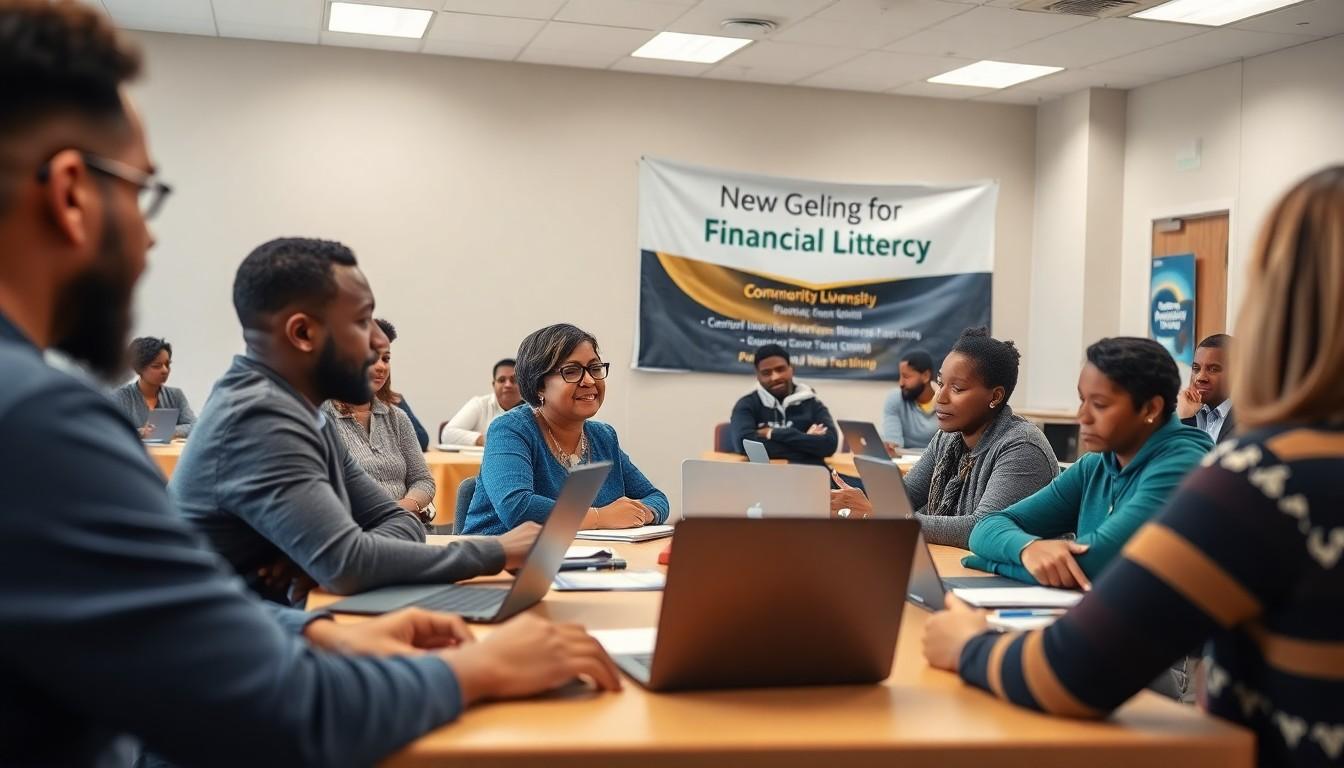In a world where financial independence feels like a distant dream for many, the Office of Economic Self-Sufficiency steps in like a superhero armed with resources and support. Imagine a place where help isn’t just a buzzword but a tangible lifeline, guiding individuals and families toward stability and self-reliance. This office is not just about welfare checks; it’s about empowering people to take control of their financial futures—think of it as a personal trainer for your wallet!
With a mission to break the cycle of dependency and promote economic growth, the Office of Economic Self-Sufficiency offers a variety of programs designed to uplift and educate. Whether it’s job training, financial literacy workshops, or access to essential services, this office is your go-to resource for turning dreams of self-sufficiency into reality. Who knew achieving economic freedom could be so accessible—and maybe even a little fun?
Office of Economic Self Sufficiency
The Office of Economic Self-Sufficiency focuses on providing resources that enable financial independence. This office offers various programs tailored to help individuals and families transition from dependency to self-sufficiency. Job training opportunities equip participants with essential skills necessary for today’s job market. Financial literacy workshops enhance knowledge in budgeting, saving, and managing resources.
Support services extend beyond conventional welfare systems. Comprehensive assistance includes access to housing, transportation, and childcare resources. Each program aims to address specific barriers that individuals face in achieving economic stability. Community outreach initiatives ensure that information about services reaches those in need.
Collaboration with local organizations strengthens the impact of the office. Partnerships with businesses create job opportunities for participants, fostering a strong community connection. The office continuously evaluates and updates programs based on feedback to meet the evolving needs of clients.
Empowerment remains at the core of initiatives offered. Individuals receive the tools needed to make informed financial decisions and reduce reliance on assistance. The office actively promotes a culture of self-sufficiency through ongoing support and education.
The Office of Economic Self-Sufficiency stands as a vital resource. It inspires individuals and families to take control of their economic futures while providing essential support on their journey to independence.
Services Offered by Office of Economic Self Sufficiency

The Office of Economic Self-Sufficiency delivers a range of services designed to promote financial independence and support individuals and families in their pursuit of self-sufficiency.
Financial Assistance Programs
Various financial assistance programs provide crucial support to those facing economic hardships. These programs include temporary cash assistance, food assistance, and emergency funds to help with utilities and housing. Tailored resources address immediate needs, enabling clients to stabilize their situations. Eligibility requirements vary based on income, family size, and specific circumstances. Thus, applicants can find the appropriate program that meets their needs and helps reduce financial burdens.
Employment Services
Employment services enhance job seekers’ skills and connect them with potential employers. Job training equips participants with in-demand skills relevant to today’s workforce. Participants benefit from resume workshops, interview preparation, and networking events that create job opportunities. Collaboration with local businesses often leads to internships and apprenticeships, providing hands-on experience in various fields. These initiatives not only empower individuals with employment tools but also help them navigate the job market effectively.
Impact on Community
The Office of Economic Self-Sufficiency significantly influences community stability and growth. Its programs provide essential support, empowering individuals and families to achieve lasting financial independence.
Success Stories
Numerous success stories showcase the transformative impact of these initiatives. A participant in job training secured a position in a local manufacturing firm, boosting her family’s income. Likewise, a father who attended financial literacy workshops learned effective budgeting strategies, enabling his family to save for education. Community members often express gratitude, highlighting the office’s role in changing their lives. Various testimonials reveal that access to resources and support fosters resilience and hope, encouraging others to pursue their goals.
Challenges Faced
Despite its successes, the office encounters several challenges. Limited funding restricts the scope of available programs, making it difficult to address all community needs. Staff shortages hinder the ability to provide personalized support effectively, resulting in longer wait times for services. Some individuals still face barriers such as transportation and childcare, preventing them from fully engaging with offered programs. Continuous adaptation and improvement remain vital to overcoming these obstacles and extending impactful services to those who need them most.
Collaboration and Partnerships
Collaboration with local organizations enhances the effectiveness of the Office of Economic Self-Sufficiency. Partnerships create pathways for access to resources and services essential for economic independence. By working alongside community agencies, the office extends its reach to individuals and families needing support.
Local businesses play a pivotal role in this network. They offer job opportunities and internships that help participants gain practical experience. Enhancing employability through real-world engagements addresses skills gaps evident in the job market.
Collective impact also derives from partnerships with educational institutions. Programs focusing on career readiness equip individuals with the skills required by employers. These collaborations ensure tailored training that aligns with industry needs.
Community-based initiatives are essential for addressing barriers to self-sufficiency. Access to transportation and childcare services remains a priority, allowing families to pursue employment and training opportunities without hindrance. Broader community outreach ensures that underrepresented populations receive critical information about available services.
Feedback from participants continually informs the office’s approach. Evaluating collaborative efforts highlights strengths and identifies areas for improvement. Adaptation based on this input empowers the office to respond effectively to community needs.
Networking among organizations fosters a supportive environment that prioritizes holistic development. Shared resources streamline services and enhance community resilience. Together, they cultivate a robust support system that drives individuals toward economic stability.
Future Directions for Office of Economic Self Sufficiency
Sustaining growth remains a priority for the Office of Economic Self-Sufficiency. Expansion of job training programs takes center stage, ensuring they align with evolving industry demands. Increased collaboration with local businesses further enhances job placement efforts, creating pathways for meaningful employment.
Investment in digital literacy initiatives stands out as a critical area for future development. As technology continues to shape the job market, equipping participants with necessary skills becomes essential. Enhanced online financial literacy resources may empower individuals to manage their finances effectively in today’s digital economy.
Strengthening partnerships with educational institutions will further foster alignment between training programs and workforce needs. Development of apprenticeship opportunities will provide hands-on experience, allowing participants to gain valuable insights into their fields of interest. Collaborations with community organizations can amplify outreach efforts, ensuring that underrepresented populations access supportive services.
Incorporation of participant feedback plays a vital role in ongoing improvement. Regular assessments will help identify gaps in services and areas needing innovation. Overall, continuous evaluation ensures that programs remain relevant and responsive to community needs.
Addressing barriers such as transportation and childcare will also gain heightened attention. Solutions that improve access to resources will contribute to higher engagement and program success rates. Strategies that enhance service delivery to underserved areas will become a core focus of the office’s future initiatives.
Long-term sustainability hinges on diversifying funding sources. Establishing connections with philanthropic organizations can support new programs and enhance existing services. Ultimately, the Office of Economic Self-Sufficiency aims to create a resilient infrastructure that fosters economic independence for all individuals and families.
Fostering Financial Independence
The Office of Economic Self-Sufficiency plays a crucial role in fostering financial independence for individuals and families. By offering a range of tailored programs and resources it empowers participants to break free from dependency and build sustainable futures. The collaborative efforts with local businesses and educational institutions enhance employability and create meaningful job opportunities.
As the office adapts to challenges and seeks innovative solutions it remains committed to its mission of supporting community growth and stability. With a focus on continuous improvement and participant feedback the Office of Economic Self-Sufficiency will continue to inspire resilience and hope in those it serves. This commitment to fostering economic independence ensures a brighter future for many.

